Wes Anderson Knows About the Memes and Has Thoughts
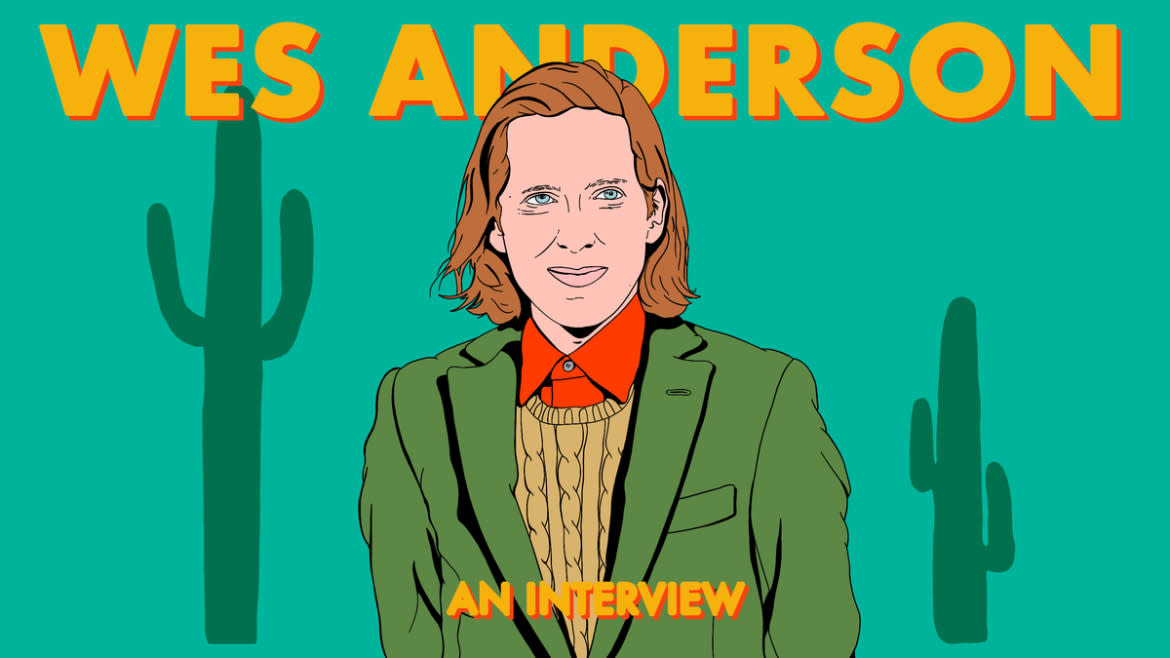
Imitators (and AI-generated pantomimes) be damned: Wes Anderson is American cinema’s most inimitable, and irreplaceable, auteur, a director whose idiosyncratic personality permeates every one of his films’ immaculately symmetrical images, period-specific musical cues, and droll witticisms. So unique is Anderson’s signature aesthetic that it’s immediately recognizable, whether he’s working in live-action or, as in the case of 2009’s Fantastic Mr. Fox and 2018’s Isle of Dogs, in stop-motion animation.
Whimsical, humorous and infused with a bittersweet longing for love, family, and meaningful connection (to others and the world), Anderson’s comedic dramas are founts of sensory wonders, marked by pristine formal compositions, vibrant colors, retro pop songs, scrupulous production and costume design, and novelistic narrative and graphical flourishes. A genre unto himself, he’s that rarest and most priceless of things: a genuine original.
And his latest, Asteroid City (in theaters June 16) is one of his true masterpieces.
As with so much of Anderson’s output, Asteroid City is a rollicking and wrenching multi-character affair about a collection of characters—led by war photographer Augie Steenbeck (Jason Schwartzman), who’s mourning the death of his wife while caring for his four children. In 1955, they all gather in the remote desert title town for the annual Junior Stargazer convention, during which time amour is struck, friends are forged, awards are won, and extraterrestrial visitors are encountered.
Featuring Tom Hanks, Scarlett Johansson, Jeffrey Wright, Tilda Swinton, Bryan Cranston, Adrien Brody, Edward Norton, Steve Carell, Hope Davis, Live Schreiber, Rupert Friend, Hong Chau, Maya Hawk, Stephen Park, Willem Dafoe, and Margot Robbie, Anderson’s cast is as gargantuan as it is typically impressive. Yet it’s his story (co-conceived with Roman Coppola) that’s the real marvel: a smorgasbord of adult yearning, fear, and regret, as well as childhood angst, courage, curiosity, and genius. It all speaks to our messy human condition and, also, art’s capacity—however incomplete—to provide purpose and meaning.
Cast as a television program about a playwright whose newest production is the core of the action, Asteroid City is a multi-layered vision of stories, and storytelling, that’s both affecting and hilarious, the latter courtesy of everything from the sight of a vending machine that dispenses martinis, to the eccentric mannerisms of a just-stopping-by alien.
All retro-futuristic splendor, off-kilter absurdity and aching-heart poignancy, it’s a film that feels like an encapsulation of its maker’s preoccupations, and it reaffirms—especially in a contemporary cinematic climate that’s increasingly antithetical to individuality—that no one makes movies as perfectly, pleasingly peculiar.
‘Asteroid City’: Wes Anderson’s Alien-Invasion Movie Is Delightfully Brilliant
On the cusp of Asteroid City’s theatrical release (following its premiere at last month’s Cannes Film Festival), we spoke with the one-of-a-kind writer/director about his trademark style, his family’s Star Wars fandom, his view on sequels, and his long-standing relationship with Bill Murray.
I want to start by saying that the only people more excited than me about this chat are my teenage daughters, who were raised on your films—particularly Fantastic Mr. Fox.
I’m an older father [laughs]. My daughter is only 7, and she doesn’t like Fantastic Mr. Fox.
Really?
No. She liked this new one. She came with us to the Cannes premiere, and she’s never been to anything like that before. She hasn’t sat in a cinema and seen very many movies anyway. But she told me it was her No. 2 movie.
After what?
Star Wars [laughs]. A New Hope, the first one.
You’re not the only person to take a backseat to Star Wars.
She also gave me an explanation for this: “I’m just very into aliens right now.” I think because of Star Wars, it’s just all space and things like that. So I wound up working in the right area, sort of…
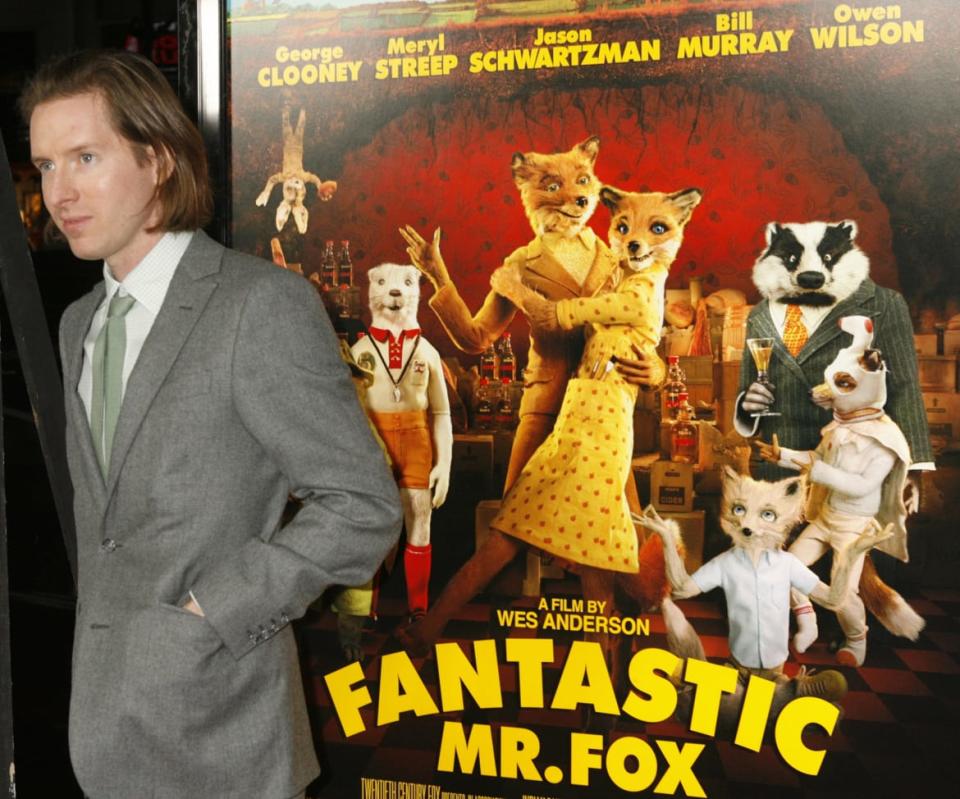
Anderson at a screening of Fantastic Mr. Fox.
Was your daughter’s fandom one of the reasons you chose to try your hand at sci-fi with Asteroid City?
No, she hadn’t seen Star Wars and didn’t know about any of that stuff back when we did the movie. That’s really recent. Star Wars is in the last two months, maybe. But she’s gone through quite a few of them.
Asteroid City was just something Roman Coppola and I had been talking about. For a long time, I had this thought to do something that had to do with the theater here [in New York City] when it was at its last high—its last golden moment, or something like that. The Actors Studio era and Broadway. I had something like that brewing, but obviously, it went in other directions. I feel like usually, you start with something and then it takes its own direction and you just follow it.
So exploring a new genre wasn’t the impetus for Asteroid City?
This definitely didn’t begin with saying, let’s do something sci-fi. We sort of had two things. We wanted to do something with Jason Schwartzman at the center; we had an idea of writing a role for Jason. I guess we had this feeling that it was going to be this father who’s dealing with this moment of extreme grief. Then we had the idea of doing something on a stage, and then we’d also tell the story of the play that they’re putting on, and that would be a big part of the movie.
That mixed with the idea of doing something… the name that was in our minds was Sam Shepard. We were thinking about something kind of Sam Shepard, out in the West somewhere. Then it swirled together and became this ’50s thing.
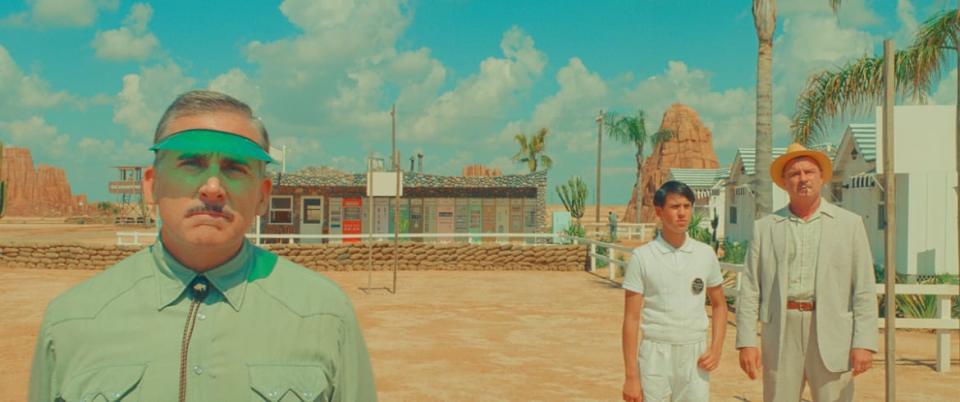
It's a very unique ’50s thing.
There are a lot of ’50s (and earlier) desert-y movies—it’s kind of an American thing. I went back to some of those and saw quite a few I had never heard of before, and it was interesting. There’s a new kind of cinema that happens in the ’50s, with Cinemascope. There’s one kind of widescreen filmmaking, David Lean, that has this epic thing. And there’s another kind that I more associate with, not necessarily B pictures but not such prestige pictures, that have a wildness to them, and a different energy. They don’t have the pace of the ’30s movies, but they have something fierce that partly comes out of the Kazan world. But then I also think it might just have something to do with this new shape of the image, and where it’s leading the filmmakers.
Do you think of yourself as having a distinctive “style?” Or does considering it in that way interfere with the creative process?
I think about how I want to stage a scene, and I might have some ideas about what we’re going to go for, for this particular movie, but that’s probably not the thing you’re talking about. You’re talking about the thing that’s the same, or at least is recognizable—which is to say, “I think I know who might have done this one” [laughs]. That is maybe something I’m in control of, but I’m not in control of what I want. I’m not in control of the way I’d like to do it.
At a certain point, I began to realize, I have a recognizable handwriting that’s beginning to take shape in these movies, and it’s happening because I’m learning something here, and finding something I like to do, and it’s many different things mixed together. It changes, but it’s still somehow [similar].
Is it difficult to stay true to yourself in that way?
I say to myself, do I want to do this? Do I want to force myself to do things in a way that I don’t want to do, or am I OK with making my movies in my way, and accepting this idiosyncrasy of my own voice? I felt like it was right for my stories and the way I was doing them. This is the way I want to do them. It’s not something I deliberately choose to continue. It’s just me doing what I want.
I think the more someone develops a voice, the more it becomes natural, and spontaneous.
I would say I’m aware of some of my own parameters that I like. And I’m aware of the stuff that I don’t want to do. I’m aware of maybe a way that I could shoot something that would be almost unnoticeable. And then there’s my way of shooting, where you say, “Oh, I see, we’re doing it like this. OK.” [laughs] I’m aware of it, but it’s just what I’m actually drawn to for some reason. I’m sure one day, they’ll be able to do some neural analysis and say, here's why you like to do it like that.
Given the homogeneity of so much mainstream American cinema, does being unique pose a challenge, professionally speaking? Or is it still a benefit, since there’s only one you?
It doesn’t do you a lot of good to absorb criticism of your own work unless you’re going to use it. If you’re not really going to use it—if you have your thing that you’re going to do—then it’s not. But I’m definitely aware of, for instance, the idea that a movie director should be able to do things in all different kinds of ways. Why do you work in just this lane? Why don’t you do Howard Hawks or Billy Wilder, and do one that’s a mystery and one that’s a comedy?
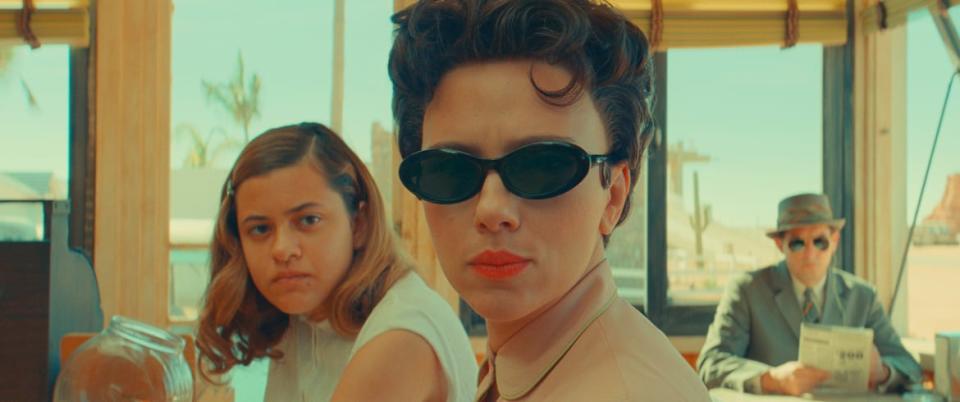
Well, for me, every time I start a movie, I feel like I’m doing something completely different. I’ve not made a movie like this before, to me. But people see the continuation of some thread. To me, I think—why do you need me to do the other stuff? You’ve got loads of people! You’ve got so many to choose from! [laughs]
I wish there were more people who were just as strange in their approach as my approach, and that were doing completely different things than me, and also developed their approach like a painter who might have a very recognizable path—this period he’s working in this way, and maybe it shifts a bit, and then maybe it goes elsewhere—but it isn’t like, each step of the way there are things going in all different directions. In cinema, it’s more expected to play in that manner.
There are exceptions, though—right?
Brian De Palma, for example– his body of work, like Hitchcock, really does rely on a certain kind of filmmaking.
There have been a few recent AI-generated trailers that imagine classic movies (Star Wars, Lord of the Rings, Dune) in “your” style. Have you seen them?
I’ve only been exposed to it verbally. I haven’t seen any of it. Obviously, it’s easy for me to go to the right web page and see it. I choose not to really engage. I guess it’s because I don’t want to get distracted by that. It’s a bit like if you’re told, “Your friend does a great version of you.” Maybe you say, I’d really like to see it, and maybe you say, I don’t want to see a version of me, even if it’s good. It can be like, “Is that me?” That’s not necessarily the thing you want.
At some point, I’m sure I’ll go in there and see. But I’ve never seen a TikTok, for instance, of anything. I’m not going to start with me. [laughs]
You have a stable of regular actors, but you also frequently collaborate with new stars, such as Tom Hanks and Steve Carell in Asteroid City. Is that balance important?
In the case of this movie, there are new people who I haven’t worked with, like Tom or Scarlett (who I just worked with as a voice). But I’ll say, it was a very gentle, encouraging group. A really comfortable group. There’s nobody in there who I went to the set like, “I’m going to have to wrangle, and this is going to be a bit of something.”
Not only is it a good thing to have new people, but sometimes, it’s a good thing to have somebody who really does make you uncomfortable, even if it’s somebody who’s going to be your friend—or who already is your friend. There are a few people who I’ve worked with, and have worked with more than once even, who are going to fight me a bit. Or they’re fighting themselves. But their way of getting themselves to their best is not just, “Where do you want us?” That’s interesting. Comfort zone isn’t necessarily the greatest place to be all the time.
Wes Anderson’s ‘Asteroid City’ Trailer Is Space-Race Perfection
Steve Carrell replaced Bill Murray on the film. Was it frustrating to hear people conflate Murray’s problems on another project with his departure from Asteroid City?
No, no, Aziz’s [Ansari] film was later, because Bill hadn’t yet gone to Aziz when we finished the movie. Bill was with us. Bill got COVID, but then after he got better, we were still shooting. Then he came to us, and at the end of the movie, he and I drove from Spain to France. The last day of the movie, I said OK [claps hands], let’s go. He was with us.
Bill is not in the category of that [the difficult actor]. Bill’s a bit different, because Bill and I have too much time together for that. There are more method-y actors who I love, and I don’t want to name them, but it’s exciting to work with somebody who’s going to fight you for control. Because you’re going to go together, and they’re going to force it to be something, and I’m not going to settle for a thing that I don’t like more than what I was looking for.
Are there any actors you’d still like to work with? You have Tom Hanks in Asteroid City…
Tom Hanks, I’ve met him a couple of times over the years. It would have been one thing to have worked with him in 1998 or something. It’s another thing to work with him now, because now, he’s gone into full-fledged legendary status. When he walked onto the set in character—and we’ve written this guy, but now there’s the guy standing in front of us as embodied by Tom Hanks—it was like, wow, look at that! It really was something. It’s almost like he stepped out of a Norman Rockwell painting.
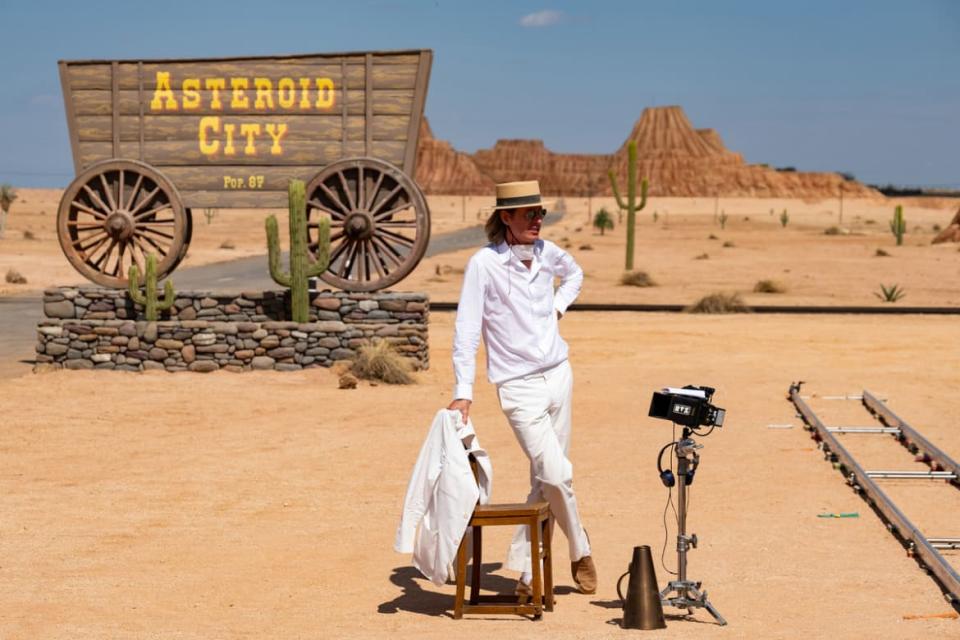
I can totally imagine that.
But who do I have my sights on? I have a physical list that I keep of people that I want to work with. Ralph Fiennes was on the list. Jeffrey Wright was on the list. Benicio del Toro was on the list. Meryl Streep was on the list—and I only got Meryl Streep for a voice [in Fantastic Mr. Fox], but I had Meryl Streep in a movie, and she was great!
Along with the people who I’ve sought out, I’ve had people come to me over the years, like Willem Dafoe and Jeff Goldblum. Both Willem and Jeff are people who I’ve absolutely loved and followed from day one of their careers. Jeff from back when he was on TV with Ben Vereen, I think—Tenspeed and Brown Shoe. I got a call that Jeff Goldblum would like to meet me, so I had dinner with Jeff, and the next thing I know, it’s, “What are you doing in the summer? I’ve got something cooking up here.”
Tilda, I kind of got that way as well, in the sense that she wrote to me and said she’d just seen my new movie—which was The Darjeeling Limited—and, “I’m around.” [laughs] Well, that’s good to know! I’m going to write you a part.
Frances McDormand too. Roman Coppola and I wrote this role for Fran, and in part it was because I knew her, and I thought if I write this part, I’ll be able to lure her in here.
Your next film (The Wonderful Story of Henry Sugar) arrives on Netflix this fall…
That’s not quite a movie. I did some Roald Dahl short story adaptations. They’re separate from each other; they’re not one thing. But the first one is a longer one, about 36-38 minutes, and so it’s a whole story—it’s The Wonderful Story of Henry Sugar. We have Ralph as Roald Dahl, and Benedict Cumberbatch and Dev Patel and Richard Ayoade and Ben Kingsley, who’s great. It’s kind of an unusual form for the storytelling that we do, because my way into it was that I realized that what I liked were his words. The way the stories are told in Roald Dahl’s words.
Just turning it into a movie, you can lose his words, by and large. We decided not to lose his words. When you see it, you’ll see what I mean. We use the words.
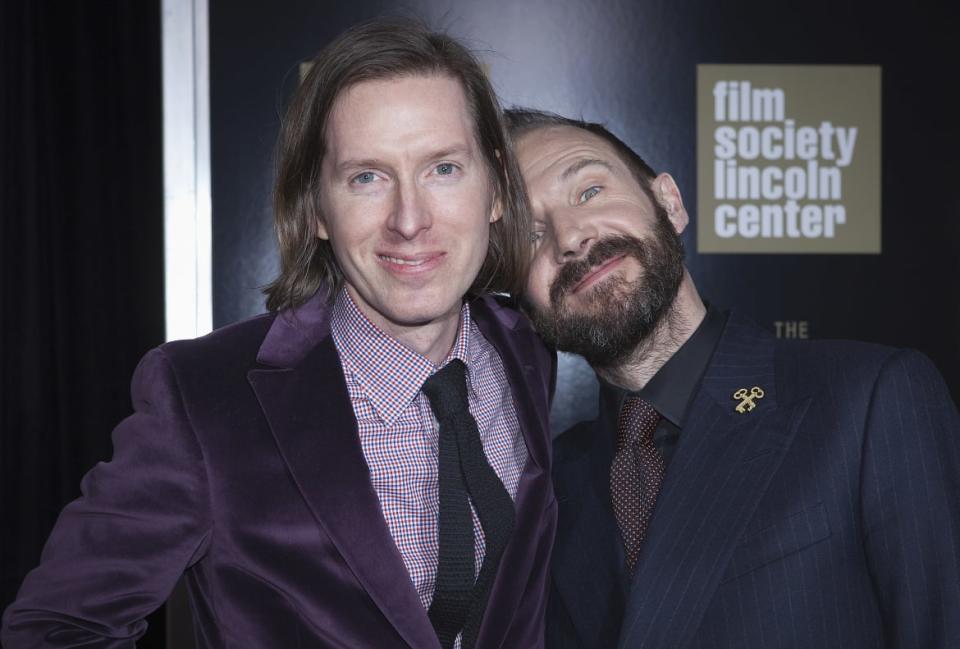
Anderson with Ralph Fiennes at a Grand Budapest Hotel event.
Have you ever considered making a sequel—or at least revisiting a prior character or setting?
In a way, I feel my way of doing that has been to take the actor and say, now let’s go some place a little different. The line from Jason Schwartzman in Rushmore to Jason Schwartzman in this is a convoluted one, but we really have three main ones together: Rushmore, The Darjeeling Limited, and this. He has a big part in Fantastic Mr. Fox, he has a good part in Moonrise Kingdom, but essentially, those three movies. Somehow, I feel like there’s a path of him growing up in these, and now he’s a father of three. He’s a grown-up.
I was remarking to someone that your own age is thrown into relief by seeing Jason transform, on screen, from a student to a father.
I was also thinking, Bill Murray, when we did Rushmore—he was quite a bit younger than I am now [laughs]. He was completely the senior statesman guru. Now, I would have said, “Yes, I’ve been watching you since you started—you’re getting good.” [laughs]
Keep obsessing! Sign up for the Daily Beast’s Obsessed newsletter and follow us on Facebook, Twitter, Instagram and TikTok.
Get the Daily Beast's biggest scoops and scandals delivered right to your inbox. Sign up now.
Stay informed and gain unlimited access to the Daily Beast's unmatched reporting. Subscribe now.

 Yahoo News
Yahoo News 
